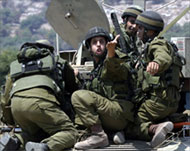Israelis in the mood for war
After pounding Lebanon for almost 10 days, Israel is little closer to rescuing two captured soldiers or preventing cross-border rocket attacks.

Ari Shavit, a columnist for Haaretz, a liberal Israeli newspaper, wrote on Friday: “Despite the media euphoria and the patriotic spin, the aerial war … is not heading for victory.
“The IAF [Israeli Air Force] alone obviously cannot solve all the problems, including the presence of thousands of rockets in Lebanon.
“There will be no resolution from the air, even if the pilots ultimately manage to locate Hezbollah leader Sheikh Hassan Nasrallah and kill him.”
On Thursday, more than 40 rockets hit Israeli cities and the captured soldiers remained in the hands of Hezbollah.
The attacks continued on Friday.
These rocket strikes have underscored Israel’s lack of tangible success while simultaneously raising enthusiasm for more strikes against Lebanon.
A poll on Friday found that 90% of Israelis believe that the offensive should continue until Hezbollah is driven out of southern Lebanon, but they are divided on how to achieve that goal.
Israeli divisions
Ze’ev Schiff, Haaretz’s long-standing military affairs correspondent, summed up the country’s dilemma.
|
“It is clear that the air force alone cannot solve the problem of missiles being fired at Israel” Ze’ev Schiff, Israeli columnist |
“Even though it is clear that the air force alone cannot solve the problem of missiles being fired at Israel, there is no real support for a broad, lengthy ground operation in Lebanon,” he wrote on Friday.
But as Hezbollah rockets continue to hit cities and towns across the north of the country, Israeli opinion is slowly starting to tilt in favour of invasion as the only viable option.
Uri Dromi, formerly Yitzak Rabin’s chief spokesman, wrote in The Independent on Friday that Israelis agree that “doing nothing in the face of such aggression is not an option at all”.
History’s lessons
A desire for security at home may outweigh Israelis’ fears that a new ground invasion of Lebanon would risk repeating the mistakes of Israel’s previous war in 1982.
Then, in an echo of today’s crisis, Israel invaded Lebanon to halt Palestinian rocket attacks on northern Israel.
But although the invasion swiftly silenced the rockets, it also had unexpected consequences.
Lebanese Shia, angered by the invasion and subsequent occupation, formed Hezbollah and waged a guerrilla campaign against Israeli troops in Lebanon.
But Dromi believes that the comparison with 1982 is misleading.
 |
|
Uncomfortable memories: Israeli armour on the Lebanese border |
“Why is there such unity across the Israeli public, politicians and commentators, on this war, when there was no such agreement on, for example, the 1982 Lebanon war?” he asks.
“The answer is simple: Because the war in Lebanon in 1982 was not about our survival; this one is.
“If Hezbollah gets away with its present act, then the message for the more demanding challenges in the future is bleak.”
Growing fears
Israelis are already unnerved by hostile statements made by Mahmoud Ahmadinejad, the Iranian president.
The recent rocket attacks against Israeli cities by Hezbollah, which is backed and funded by Iran, have added to a growing feeling that Israel has to strike back hard against Hezbollah and perhaps even against Iran itself.
Even some peace activists who campaigned for Israel to withdraw from Lebanon – which it eventually did in spring 2000 – have joined Israel’s pro-war camp this time.
 |
| Hezbollah attacks forced Israel’s withdrawal from Lebanon in 2000 |
Orna Shimoni, founder of the Four Mothers movement that campaigned for a withdrawal from Lebanon, today says Israelis should support the government and the military.
“It is clear that we were attacked inside our own sovereign territory, with no provocation at all,” Shimoni wrote in an opinion piece for Ynet News.
“There is no question that we must now strengthen both the IDF and our political echelon to allow them to obtain two main objectives: Bringing our kidnapped soldiers home and disarming Hezbollah, and pushing that organisation away from the Israel-Lebanon border.”
Moral dilemma
Other Israelis grapple with the moral issue of the war – that the Israeli army has already killed more than 300 Lebanese civilians supposedly to protect Israeli civilians in the future.
Samuel Freedman, a professor of journalism in New York, wrote in Friday’s Jerusalem Post: “There is something difficult about holding in your brain two truths.
“It is terrible to see Beirut being pummelled and to know civilians are dying … [but] it is more terrible to give Iran the moral victory of a stalemate now, emboldening it to mount even greater attacks against Israel.”